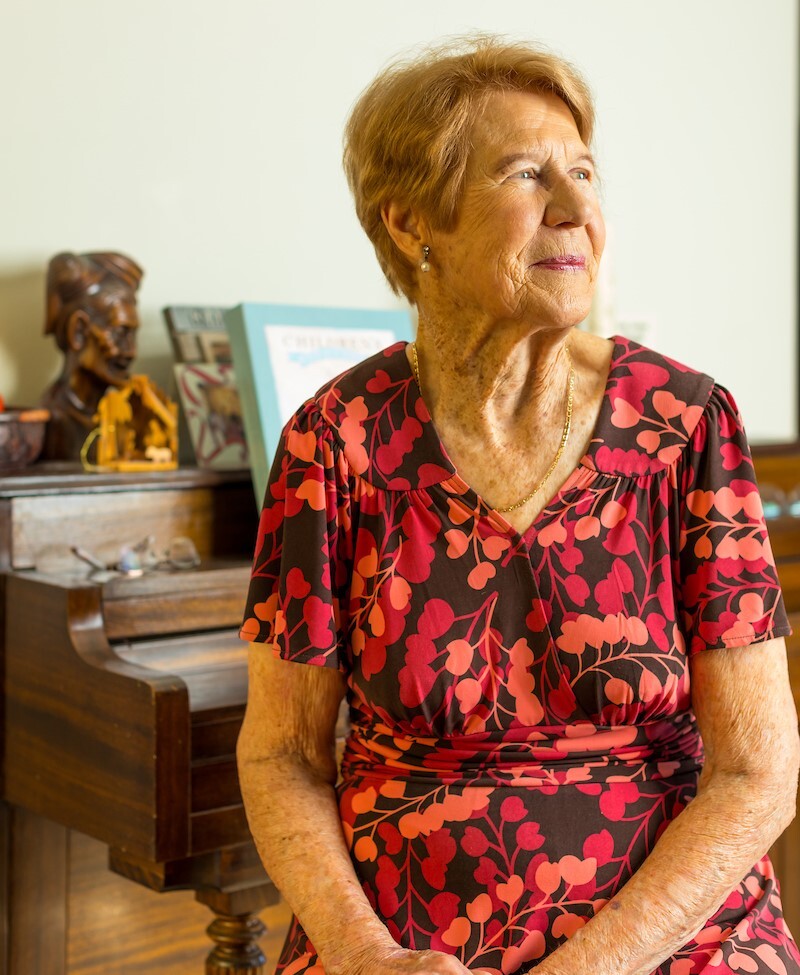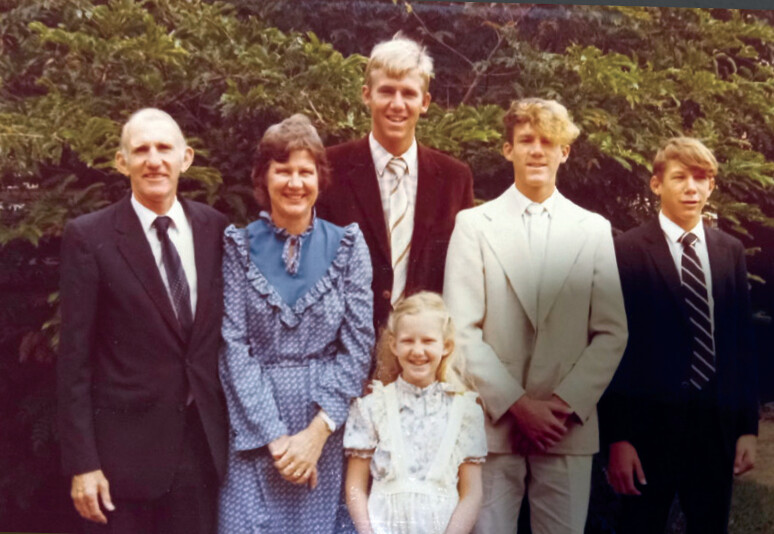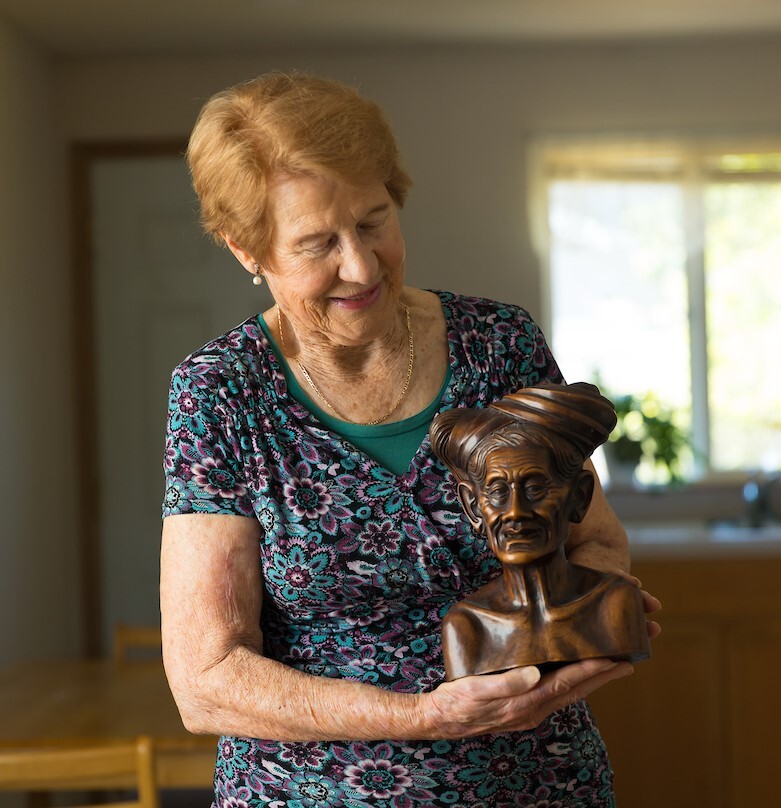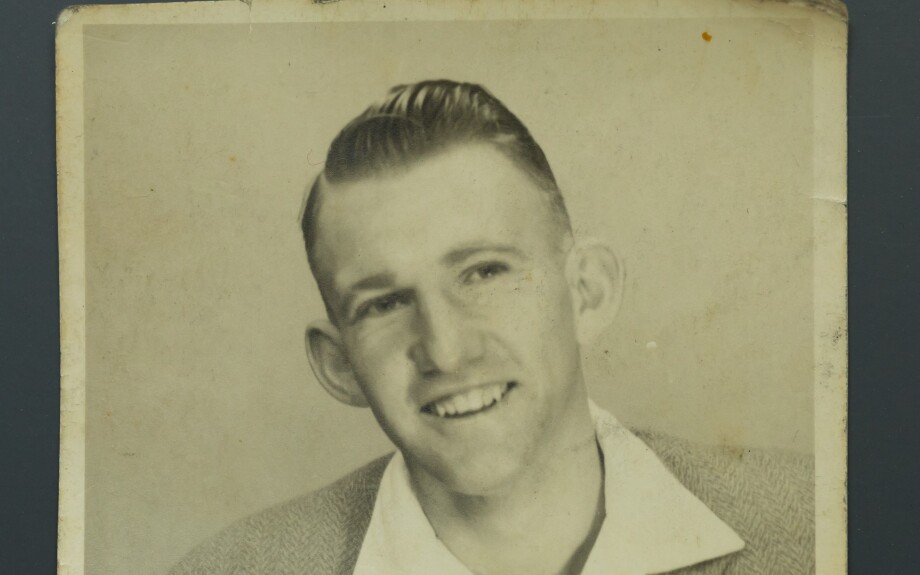Editor's note: This article was the cover story of the September/October 2023 issue of LDS Living magazine.

“Is it riveting?” Marie Vischer Elliott asks me with an intensity in her eyes that is impossible to miss, even though we are speaking through a video call. I look back at the World War II prison camp survivor and don’t hesitate in answering with a resounding yes. As the interviewer, I hadn’t expected Marie to jump in and ask the first question, but I am interested to see where this goes.
“Is it informative?” she asks next in her delightful South African accent. My response is, again, an enthusiastic yes.
Marie follows up with one final question: “Is it soul-searching?” That is the easiest question of all to answer. We’ve come together to discuss Under the Java Moon, a novel by Heather B. Moore about Marie’s experiences as an innocent five-year-old girl forced to live in a prison camp on a tropical island of Indonesia during World War II— how could that not be soul-searching?
The Marie sitting in front of me is no longer the starved, abused, fear-filled little girl of her childhood. She is regal, happy, and far more energetic at 86 than I expected her to be. A copy of the Mona Lisa hangs on the white wall behind her. Marie tilts her head back every time she laughs, like when she saw her face in the Zoom camera and quipped, “Well, I thought I did my hair.”
The video camera is close to her face; well-worn laugh lines and worry lines help tell her story of both hope and fear. Marie exudes confidence, radiating hope and love as she talks—a striking contrast to how she felt after prison camp: “I was a worthless creature,” she tells me. “I had been spat upon. I had no confidence in myself. Nothing. Zero. I was sure I was worth nothing.” Although she was born with a happy disposition, she says war made her overly serious and worried about the future.
The more Marie talks, I realize that what I’d read in the book was only a chapter—a riveting, informative, soul-searching chapter— but there is so much more to her story. As she tells me of her journey after Java, my heart beats faster in awe and excitement as I again and again see evidence of a loving Heavenly Father eager to take a scared, wounded soul and make her whole again.
Marie’s story of rescue began, not ended, when she finally stepped outside the prison fence that held her captive. And I believe she will be the first to tell you that she wouldn’t have found healing without making covenants with Jesus Christ—that she could not have stepped out from under the cloud of fear and worthlessness without Him.
Most of us are not going to have to go through what Marie did. Not by a long shot. But we do all need the touch of the Master Healer in our own ways. As you read a bit more from Marie’s book of life, I hope that you, like me, will be even more convinced that Jesus Christ brings relief when we need it most. And I hope you will learn that no matter the pain, loss, or injustice we experience, healing and happiness are always within our grasp.
Bombs on Her Island Paradise
When I sat down to read Under the Java Moon, I was surprised to learn how far-reaching the effects of World War II had been. Even the little island of Java (in what is now Indonesia) was pulled into the conflict. Marie’s parents had moved to Java from the Netherlands because at the time the islands were under Dutch rule and Marie’s father was working as an engineer for the Dutch navy. The family, including Marie’s beloved little brother, Georgie, and their grandmother, lived a comfortable, happy life in their island paradise.
But then bombs began to fall from the sky. The Japanese attacked Java for its rich oil supply, and on January 10, 1942, Marie cowered under a hedge in their front yard and watched Japanese soldiers march totally unopposed right in front of their house. Marie and members of her family were later herded with other Dutch citizens into Tjideng Camp. Life in the deplorable, often violent prison camp would turn from bad to worse to fatal as weeks turned to months and months turned to more than three years.
I had to stop and take a deep breath after reading that Marie had been so hungry that she’d tried licking up dirt in a desperate attempt to find relief from the pain in her stomach. I grimaced at the cruelty of some of the guards: prisoners were forced to stand and bow in the sweltering sun twice a day during roll calls that sometimes lasted for hours, women and children dropping to the dirt in exhaustion, some never to get back up. In a fit of rage, a guard stomped a helpless child’s only food into the mud, rendering it totally inedible right in front of her. Marie remembers hearing women scream as they were beaten and can’t forget the bruises on her own mother’s face. Tropical sores, dysentery, and malaria ran rampant and there were little to no medical resources to stop them.
Everyone worked long hours in the camp. They were assigned duties such as collecting garbage, cleaning out sewer ditches, working in the kitchen, or washing linens for the makeshift camp hospital. Teenage girls were tasked with taking care of dead bodies: at first, they loaded them in coffins to be transported out of the camp, but when the death toll grew too high, the girls dug mass graves.
With the tragic exception of Marie’s grandmother, the family survived, but they struggled to find a way off the island when the war was finally over. Ironically, leaving the protective walls of the prison they’d so desperately wanted to be free of was now dangerous—Indonesian natives were reclaiming their independence and were violent toward the Dutch. Fortunately, Marie’s father was able to secure them passage on a ship, but their journey to safety was far from over.
The last pages of the book describe the family sprinting amid enemy fire to board the overcrowded boat. As I closed the book, I was deeply curious about what happened next to these people I’d come to love. So it is there that my questions for Marie began.
A Search for Truth
Marie couldn’t stop envisioning being blown to pieces. She was just eight years old when her family left their island home for the Netherlands, and their ship’s path was riddled with sea mines that would explode if it came too close. All she could do was lie on her small cot and imagine the worst. And so for the first time in her life, Marie began to pray. She hadn’t thought much about God or religion before—her mother was her everything. But now, afraid and sickly from prison camp and diseases that spread quickly around the crowded ship, she began to pray that God would keep her safe.
Fortunately the ship made it safely to England, but Marie, too ill to walk, had to be carried by her father across the dock. She then spent three months recovering in a makeshift hospital in the Netherlands. Marie survived, but her cherished little brother, Georgie, succumbed to double pneumonia about a month after they’d made it to Europe.
Even now, Marie’s face and voice fill with tender emotion as she tells me how Georgie was a calm, loving child whose sweet nature helped her mother find the will to endure prison camp. Before he died, he’d been in a coma when suddenly he reached out his arms and said, “Oma, ik kom”—Dutch for, “Grandma, I’m coming.” He died the next day.
Young Marie believed their grandmother really had come to take her brother to live in heaven, but she wanted to know more about what that life would be like. “The first thing, after being so close to death, that I wanted to know is where am I going when I die?” she says. “I wanted to know about the Bible too because I had started reading it on my own. I loved all the old tales in the Old Testament: Jonah and the whale, Noah and the ark, all the beautiful stories you love as a child, … but I wanted to know more.” So at nine years old, Marie found and attended a nearby Sunday School on her own.

After five years in the Netherlands, Marie’s father accepted a new position on a ship, and the family relocated to Durban, South Africa. Marie arrived at her new home as a shy 14-year-old and started public school in English—a language she didn’t understand. The other students were anything but welcoming to the new foreigner, teasing her, spitting on her, and even giving her chocolates laced with laxatives. “I cried bitter tears every night,” Marie remembers. “I always considered myself extremely ugly and had no confidence.”
In addition to her low self-esteem, Marie was fearful of the future. Prison camp had darkened her view of the world; she was unforgettably aware of what terrible things could happen to people. Having previously experienced extreme hunger also made her anxious about wasting even a bit of food. And yet, though times were difficult, she was determined to succeed and learned English quickly, becoming top of her class.
The search for truth Marie had begun in the Netherlands continued in South Africa. She attended various churches, and eventually she and her mother affiliated themselves with a Methodist church. But when Marie asked the minister her questions about life after death, she couldn’t seem to get satisfactory answers. So as she grew older, she continued to visit other churches and kept asking questions—and her frustration to find the truth kept growing.
“One day, I was in my last year of matriculated high school, and I was paging through my Bible when I dumped it in the wastepaper basket and said, ‘You know what? I cannot find a church anywhere that teaches what is in the Bible,” Marie says.
Her questions piled up and wouldn’t leave her: Why didn’t the churches she visited baptize by immersion like the Bible said? Weren’t we supposed to have a prophet like Moses or Abraham? Was the Bible even true? Did God even exist?
As she tells me this story with as much emotion in her voice as if it happened yesterday, I can’t help but picture heaven looking down on Marie in that moment and saying, “Just wait, just wait!” The restored gospel, with the truths to transform this anxious young woman, were on their way. But first, there was a very special person Marie had to meet.
Changed by Love
“Oh, it was very exciting, that I can tell you” is the first thing Marie says when I ask her about how she met Bob Elliott. The story of how they fell in love would make anyone smile, but what that love did for Marie nearly brings me to tears.
One night, when Marie was 19, she and her boyfriend had plans to go dancing at a party. “That’s what you did in my day,” Marie says of late 1950s Durban, South Africa. But her boyfriend had to leave the party early, so he asked his friend Bob to take Marie home. But Bob first asked Marie to teach him the jive, and before they knew it, they were dancing the night away. When they arrived at Marie’s doorstep after the dance, Bob asked if she would go to a movie with him sometime—and she surprised herself by saying yes. Despite that whirlwind first meeting, Bob and Marie’s courtship was slow going for a while afterward: “Even though I didn’t have the Church in my life, I wanted to marry forever, for eternity,” she says. “So it had to be the right person.”
And it turned out that Bob was the right person for many reasons. When I asked Marie how she overcame the feelings of worthlessness and fear that the prison camp inflicted on her, she didn’t hesitate for even a second before speaking of Bob.
“I knew he loved me a lot,” she says. “Because he loved me so much, I became more confident. … He was just so kind; he loves everybody. He was an extrovert and always invited people to our home. I was an introvert and would stay in the background cooking. But I became a lot more open. Because he was so open and so jovial and happy, I became a lot happier.”
After explaining what a blessing it was to marry Bob, Marie then shared another decision that was just as important in finding herself: “And then, of course, the gospel. Oh my gosh, the gospel.”
Truth in the Living Room
Bob and Marie married in their Methodist church in 1960 and over the next several years welcomed three sons into their family. Marie continued to pray and asked Heavenly Father that if there was a true church upon the earth, would He please show it to her. And then, shortly after her third son, Dean, was born, the truth finally came right to their living room.
Marie and Bob had befriended a young couple who invited them to learn about The Church of Jesus Christ of Latter-day Saints. They said yes, but Marie did not have high hopes. She and Bob agreed that if after one meeting with the missionaries they didn’t like the message, they would forget the whole thing. But that’s not what happened.
“I was hooked; they were able to answer all my questions,” Marie says. She knew by their second meeting that she wanted to be baptized. Bob, however, wasn’t so sure, and he didn’t agree to baptism. But Marie had found the truth and was sticking to it, even if she was joining alone. She was baptized at age 33 in 1971. Her oldest son, Paul Elliott, remembers the early days of going to church with his mom.
“Nobody knows how difficult it is for a mother with three boys who don’t necessarily want to go to church every week. … And it wasn’t like we were just walking around the corner,” Paul says. They drove 20 miles each week to get to their small branch. “There weren’t many members in South Africa. It was a very, very obscure religion. And anything that came up about the Church was always plastered in the newspapers as this cult taking advantage of people. Everything was always skewed.”
But Marie carried on, and with each sacrament meeting she attended and each chapter of the Book of Mormon she read, the truth about who she really was as a child of God sank deeper into her heart.
“It took me a while to know that God actually loves me, … that I actually matter to Him,” she says. “But I’ve learned; I know now. … The gospel made a major change in my life. I thank Heavenly Father for it every day.”
It took me a while to know that God actually loves me, … that I actually matter to Him. But I’ve learned; I know now.
As she immersed herself in the gospel, Marie’s outlook about the future started to brighten: learning that God has a plan for each of His children helped her step out from under the cloud of worry that something terrible might happen to her again. “[I could] forget about worrying and give it to Heavenly Father,” she says.
She was also delighted to learn that temple work could be performed for her deceased family members and that one day she would be reunited with her beloved brother Georgie.
But as much as Marie was changing due to her new faith, she didn’t want to push it on her husband. Instead, she would simply share with him the uplifting stories and messages she heard at church. After seven years of gentle sharing, Bob decided he wanted to be baptized with their youngest son, who was turning eight. Miraculously enough, Marie’s sister Emy also decided she wanted to be baptized within a week of Bob.
“It was the first time I felt like I was walking on air. You know how Peter walked on the sea? I walked on a cloud. I was in heaven; I was afloat. I had this wonderful, peaceful feeling. I couldn’t believe it,” Marie says.
And her heaven was only going to get better. Two years later, after cutting back to save money any way they could, the family, now complete with three sons and a daughter, had enough to travel to the London England Temple to be sealed.
“Ever since I’d joined the Church, I’d wanted to go. I wanted to be an eternal family!” Marie says. “I was being sealed to my husband forever! How can you describe that? Absolutely incredible that it was actually happening to us. So much joy. So much happiness.” A happiness that Marie’s trek through sorrow and loss perhaps uniquely prepared her to appreciate.

Marie and Bob raised their children in South Africa until one by one they left for occupational or educational opportunities in the US. And then, just two weeks after their daughter Sasha left to start studying at Brigham Young University, Bob suddenly died at age 61 of a stroke. “The good die young, I suppose,” Marie tells me, not elaborating.
But Sasha told me it was a devastating setback to her mother, who had to “find herself again” and figure out what her life would look like without Bob. Marie stayed in South Africa for several more years until her children convinced her it was time she came to the US to be near them. So she squared her shoulders, looked to God, and embraced her latest challenge head-on.

Sasha told me what her mother’s lifelong example of perseverance and faith means to their family. “My mum took the lead by joining the Church first, and we’ve seen that [faith] throughout our lives: she’s so faithful no matter what kind of obstacles get thrown her way,” she says.
So Marie packed just two suitcases and immigrated to a new country at age 65. At the age many people plan to retire, Marie lost the majority of her money due to unfavorable conversion rates and had to start all over.
Out There in the World
Marie settled in Salem, Oregon, where Sasha was living, and took a job as an administrative assistant with an architectural firm and kept to a budget. Though her material possessions were few (her home to this day is 999 square feet) and her finances limited, over the next 20 years Marie lived her life to the fullest.
“She has so many friends and has such a social calendar,” Paul says. “I think if you put all the children’s schedules together, she outpaces everybody in terms of what she gets up to.”

At 86, Marie is both the youth Sunday School teacher and historian for her ward, walks or hikes several miles a day, plays pickleball, and, though she has the means to retire, still works nearly full-time at the same architectural firm she started at when she immigrated to the US. She also plays an active role in the lives of her 15 grandchildren and two great-grandchildren: sending handwritten letters, playing board games, and taking flights to visit them, often arriving with homemade shortbread cookies. Her 22-year-old granddaughter, Ceanne Elliott, has appreciated her grandma’s spiritual influence as well.
“Her resilience has influenced me to stay strong and turn to Christ for guidance when life gets hard—and sometimes that’s a little hard for me. But something I strive toward in my life is to be more like my grandma,” she says.
Near the end of our conversation, Marie enthusiastically told me, “I’m just out in the world!”—a significant statement considering how the world was once very cruel to her. At times, that world continues to be full of contention and anger, just like it was all those years ago in Java. And while she knows it won’t ever be completely peaceful until the Savior comes again, she chooses to share the inner peace she has found through Christ as far and wide as she can.
“All my life, I have wanted to do something great, something amazing. And so I always thought, ‘Now, what can I do that is so amazing that will change people’s lives and make an impact on the world?’ And then one morning, I woke up and thought, ‘Marie, you are not the type of person to do something absolutely great and amazing. But you can make a difference by little acts of kindness,’” she says.
Marie may see her contributions to the world as being little. But in fact, the gift of sharing her story—whether in a book or in an afternoon conversation like ours—is an act that continues to change lives and impact the world, just as Marie always wanted.

Under the Java Moon
Under the Java Moon highlights a little-known part of WWII history and the impact of war on Indonesia, its people, and the more than 100,000 Dutch men, women, and children who were funneled into prison camps and faced with the ultimate fight for survival.
▶ You may also like: Nathan Pacheco talks mental health, covenant living, and singing for Pres. Nelson










